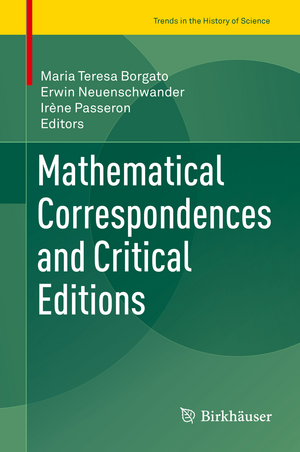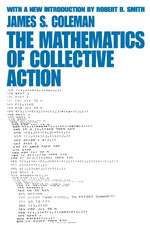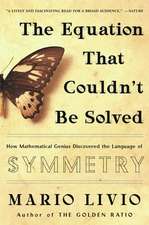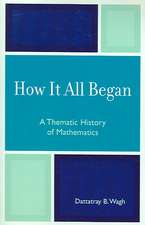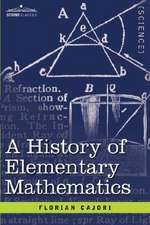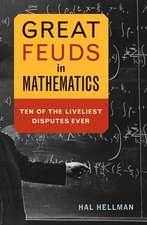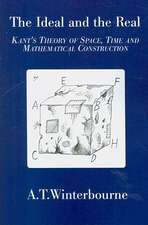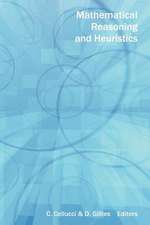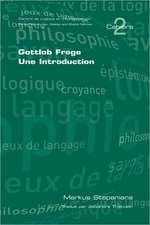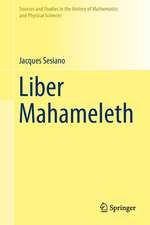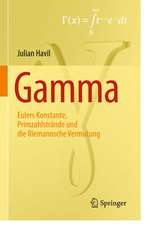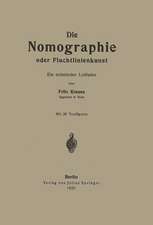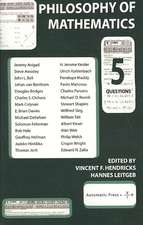Mathematical Correspondences and Critical Editions: Trends in the History of Science
Editat de Maria Teresa Borgato, Erwin Neuenschwander, Irène Passeronen Limba Engleză Hardback – 23 mar 2019
Wallis, Leibniz, the Bernoullis, D'Alembert, Condorcet, Lagrange, Gauss, Hermite, Betti, Cremona, Poincaré and van der Waerden are undoubtedly authors of great interest and their letters are valuable documents, but the correspondence of less well-known authors, too, can often make an equally important contribution to our understanding of developments in the history of science.
Mathematical correspondences also play an important role in the editions of collected works, contributing to the reconstruction of scientific biographies, as well as the genesis of scientific ideas, and in the correct dating and interpretation of scientific writings.
This volume is based on the symposium “Mathematical Correspondences and Critical Editions,” held at the 6th International Conference of the ESHS in Lisbon, Portugal in 2014. In the context of the more than fifteen major and minor editions of mathematical correspondences and collected works presented in detail, the volume discusses issues such as
• History and prospects of past and ongoing edition projects,
• Critical aspects of past editions,
• The complementary role of printed and digital editions,
• Integral and partial editions of correspondence,
• Reproduction techniques for manuscripts, images and formulae, and the editorial challenges and opportunities presented by digital technology.
Din seria Trends in the History of Science
- 15%
 Preț: 647.08 lei
Preț: 647.08 lei - 15%
 Preț: 653.98 lei
Preț: 653.98 lei - 18%
 Preț: 952.26 lei
Preț: 952.26 lei - 18%
 Preț: 1553.64 lei
Preț: 1553.64 lei - 18%
 Preț: 958.88 lei
Preț: 958.88 lei - 15%
 Preț: 638.76 lei
Preț: 638.76 lei - 24%
 Preț: 2082.73 lei
Preț: 2082.73 lei - 18%
 Preț: 1004.67 lei
Preț: 1004.67 lei - 18%
 Preț: 951.91 lei
Preț: 951.91 lei - 24%
 Preț: 685.92 lei
Preț: 685.92 lei - 18%
 Preț: 786.04 lei
Preț: 786.04 lei - 18%
 Preț: 785.11 lei
Preț: 785.11 lei - 18%
 Preț: 1004.48 lei
Preț: 1004.48 lei -
 Preț: 366.43 lei
Preț: 366.43 lei - 18%
 Preț: 1001.95 lei
Preț: 1001.95 lei - 18%
 Preț: 1129.33 lei
Preț: 1129.33 lei - 18%
 Preț: 950.96 lei
Preț: 950.96 lei
Preț: 1118.62 lei
Preț vechi: 1364.17 lei
-18% Nou
Puncte Express: 1678
Preț estimativ în valută:
214.04€ • 223.50$ • 176.75£
214.04€ • 223.50$ • 176.75£
Carte disponibilă
Livrare economică 25 martie-08 aprilie
Preluare comenzi: 021 569.72.76
Specificații
ISBN-13: 9783319735757
ISBN-10: 3319735756
Pagini: 314
Ilustrații: XXIV, 345 p. 32 illus., 19 illus. in color.
Dimensiuni: 155 x 235 mm
Greutate: 0.73 kg
Ediția:1st ed. 2018
Editura: Springer International Publishing
Colecția Birkhäuser
Seria Trends in the History of Science
Locul publicării:Cham, Switzerland
ISBN-10: 3319735756
Pagini: 314
Ilustrații: XXIV, 345 p. 32 illus., 19 illus. in color.
Dimensiuni: 155 x 235 mm
Greutate: 0.73 kg
Ediția:1st ed. 2018
Editura: Springer International Publishing
Colecția Birkhäuser
Seria Trends in the History of Science
Locul publicării:Cham, Switzerland
Cuprins
Philip Beeley: Historiographical Change and Editorial Practice: The Origins of the Edition of the Correspondence of John Wallis (1616-1703).- Eberhard Knobloch: Notes on Series VII and VIII of the Leibniz-Edition.- Sulamith Gehr: The Edition of the Bernoulli Correspondence: A Historical Overview and Insights into the Most Recent Developments.- Irène Passeron: D’Alembert’s Mathematical Correspondence: Beyond the Formal Description of Networks. Alexandre Guilbaud: The Digital Edition of D’Alembert’s Correspondence.- Nicolas Rieucau: La correspondance scientifique de Condorcet: un aperçu.- Luigi Pepe: Publication of the Complete Works of Lagrange in the Digital Age.- Karin Reich, Elena Roussanova: A Critical Survey and Inventory of the Edited Works of Carl Friedrich Gauss.- Andrea Del Centina, Alessandra Fiocca: On the Correspondence of Sophie Germain.- Catherine Goldstein: Hermite and Lipschitz: A Correspondence and Its Echoes.- Cinzia Cerroni: The Correspondences of Luigi Cremona and Placido Tardy in the Libraries of Genoa.- Maria Teresa Borgato, Iolanda Nagliati: The Renewal of Mathematical Research in Italy: The Correspondences Between Brioschi-Betti (1857-1890) and Brioschi-Tardy (1853-1893).- Giorgio Israel, Ana Millán Gasca, Luigi Regoliosi: Democratization of Mathematics Through Cremona's Correspondence with Foreign Colleagues (1860-1901).- Paolo Freguglia, Giuseppina Fenaroli, Giuseppe Canepa: On Giusto Bellavitis’s correspondence.- Scott A. Walter: Poincaré-week in Göttingen, in light of the Hilbert-Poincaré correspondence of 1908–1909.- Erwin Neuenschwander: The Correspondence of Bartel Leendert van der Waerden (1903-1996).
Textul de pe ultima copertă
Mathematical correspondence offers a rich heritage for the history of mathematics and science, as well as cultural history and other areas. It naturally covers a vast range of topics, and not only of a scientific nature; it includes letters between mathematicians, but also between mathematicians and politicians, publishers, and men or women of culture.
Wallis, Leibniz, the Bernoullis, D'Alembert, Condorcet, Lagrange, Gauss, Hermite, Betti, Cremona, Poincaré and van der Waerden are undoubtedly authors of great interest and their letters are valuable documents, but the correspondence of less well-known authors, too, can often make an equally important contribution to our understanding of developments in the history of science.
Mathematical correspondences also play an important role in the editions of collected works, contributing to the reconstruction of scientific biographies, as well as the genesis of scientific ideas, and in the correct dating and interpretation of scientific writings.
This volume is based on the symposium “Mathematical Correspondences and Critical Editions,” held at the 6th International Conference of the ESHS in Lisbon, Portugal in 2014. In the context of the more than fifteen major and minor editions of mathematical correspondences and collected works presented in detail, the volume discusses issues such as
• History and prospects of past and ongoing edition projects,
• Critical aspects of past editions,
• The complementary role of printed and digital editions,
• Integral and partial editions of correspondence,
• Reproduction techniques for manuscripts, images and formulae, and the editorial challenges and opportunities presented by digital technology.
Wallis, Leibniz, the Bernoullis, D'Alembert, Condorcet, Lagrange, Gauss, Hermite, Betti, Cremona, Poincaré and van der Waerden are undoubtedly authors of great interest and their letters are valuable documents, but the correspondence of less well-known authors, too, can often make an equally important contribution to our understanding of developments in the history of science.
Mathematical correspondences also play an important role in the editions of collected works, contributing to the reconstruction of scientific biographies, as well as the genesis of scientific ideas, and in the correct dating and interpretation of scientific writings.
This volume is based on the symposium “Mathematical Correspondences and Critical Editions,” held at the 6th International Conference of the ESHS in Lisbon, Portugal in 2014. In the context of the more than fifteen major and minor editions of mathematical correspondences and collected works presented in detail, the volume discusses issues such as
• History and prospects of past and ongoing edition projects,
• Critical aspects of past editions,
• The complementary role of printed and digital editions,
• Integral and partial editions of correspondence,
• Reproduction techniques for manuscripts, images and formulae, and the editorial challenges and opportunities presented by digital technology.
Caracteristici
The first book based on an international symposium devoted to mathematical correspondence in the context of critical editions Covers a broad range of mathematicians and gives information about the editions of their collected mathematical papers Spans over the Scientific Revolution, Enlightenment, Industrial Revolution, Italian Risorgimento to German National Socialism
